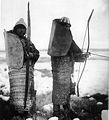Portal:Siberia
The Siberia Portal
A portal dedicated to Siberia
Introduction
Siberia | |
|---|---|
Geographical region | |
 Siberian Federal District |
Siberia (/saɪˈbɪəriə/ sy-BEER-ee-ə; Russian: Сибирь, romanized: Sibir', IPA: [sʲɪˈbʲirʲ] ) is an extensive geographical region comprising all of North Asia, from the Ural Mountains in the west to the Pacific Ocean in the east. It has formed a part of the sovereign territory of Russia and its predecessor states since the centuries-long conquest of Siberia, which began with the fall of the Khanate of Sibir in the late 16th century and concluded with the annexation of Chukotka in 1778. Siberia is vast and sparsely populated, covering an area of over 13.1 million square kilometres (5,100,000 sq mi), but home to roughly a quarter of Russia's population. Novosibirsk, Krasnoyarsk, and Omsk are the largest cities in the area.
Because Siberia is a geographic and historic concept and not a political entity, there is no single precise definition of its territorial borders. Traditionally, Siberia spans the entire expanse of land from the Ural Mountains to the Pacific Ocean, with the Ural River usually forming the southernmost portion of its western boundary, and includes most of the drainage basin of the Arctic Ocean. It is further defined as stretching from the territories within the Arctic Circle in the north to the northern borders of Kazakhstan, Mongolia, and China in the south, although the hills of north-central Kazakhstan are also commonly included. The Russian government divides the region into three federal districts (groupings of Russian federal subjects), of which only the central one is officially referred to as "Siberian"; the other two are the Ural and Far Eastern federal districts, named for the Ural and Russian Far East regions that correspond respectively to the western and eastern thirds of Siberia in the broader sense.
Siberia is known for its long, harsh winters, with a January average of −25 °C (−13 °F). Although it is geographically in Asia, Russian sovereignty and colonization since the 16th century has led to perceptions of the region as culturally and ethnically European. Over 85% of its population are of European descent, chiefly Russian (comprising the Siberian sub-ethnic group), and Eastern Slavic cultural influences predominate throughout the region. Nevertheless, there exist sizable ethnic minorities of Asian lineage, including various Turkic communities—many of which, such as the Yakuts, Tuvans, Altai, and Khakas, are Indigenous—along with the Mongolic Buryats, ethnic Koreans, and smaller groups of Samoyedic and Tungusic peoples (several of whom are classified as Indigenous small-numbered peoples by the Russian government), among many others. (Full article...)
Selected article -
The 1,524 mm (5 ft) broad gauge Salekhard–Igarka Railway, (Трансполярная магистраль Transpolyarnaya Magistral, i.e. 'Transpolar Mainline', popularly known as the Dead road) is an incomplete railway in northern Siberia. The railway was a project of the Soviet Gulag system that took place from 1947 until Stalin's death in 1953. Construction was coordinated via two separate Gulag projects, the 501 Railway beginning on the River Ob and 503 Railway beginning on the River Yenisey, part of a grand design of Joseph Stalin to span a railway across northern Siberia to reach the Soviet Union's easternmost territories. A rebuilt section of the railway between Nadym and Novy Urengoy on the east bank of the Nadym River is still in operation, as is the extreme western section connecting Labytnangi and the railway to Vorkuta. The section from Salekhard to Nadym is planned to be rebuilt, including a new bridge over the Ob to connect Salekhard to the rest of the Russian railway system via Labytnangi. The section from Nadym to Pangody is also planned to be rebuilt. (Full article...)
Interesting facts -
- Forest brother Alfred Käärmann hid for 7 years from Soviet officials, spent 15 years in Siberian prison camps, had his passport stamped "annulled" and was banished from Estonia until 1981.
- Eruptions of Anyuyskiy Volcano in Siberia may have inspired legends of places where hunting is banned and smoke and fire rise from the ground.
- In 1866 Polish exilees to Siberia staged an uprising trying to escape to China.
General topics
- Prehistory of Siberia
- History of Siberia
- Geography of Siberia
- North Asia § Geography
- Demographics of Siberia
- Indigenous peoples of Siberia
- Category:Flora of Siberia – includes flora taxa that are native to Siberia. Taxa of the lowest rank are always included. Higher taxa are included only if endemic.
- Siberia Governorate
- Siberian Republic
- Great Russian Regions
- Trans-Siberian Railway
Need assistance?

Do you have a question about Siberia that you can't find the answer to? Consider asking it at the Wikipedia reference desk.
General images -
Related portals
WikiProjects
Categories
Trans-Siberian Railway route map
| Trans–Siberian Railway | |||||||||||||||||||||||||||||||||||||||||||||||||||||||||||||||||||||||||||||||||||||||||||||||||||||||||||||||||||||||||||||||||||||||||||||||||||||||||||||||||||||||||||||||||||||||||||||||||||||||||||||||||||||||||||||||||||||||||||||||||||||||||||||||||||||||||||||||||||||||||||||||||||||||||||||||||||||||||||||||||||||||||||||||||||||||||||||||||||||||||||||||||||||||||||||||||||||||||||||||||||||||||||||||||||||||||||||||||||||||||||||||||||||||||||||||||||||||||||||||||||||||||||||||||||||||||||||||||||||||||||||||||||||||||||||||||||||||||||||||||||||||||||||||||||||||||||||||||||||||||||||||||||||||||||||||||||||||||||||||||||||||||||||||||||||||||||||||||||||||||||||||||||||||||||||||||||||||||||||||||||||||||||||||||||||||||||||||||||||||||||||||||||||||||||||||||||||||||||||||||||||||||||||||||||||||||||||||||||||||||||||||||||||||||||||||||||||||||||||||||||||||||||||||||||||||||||||||||||||||||||||||||||||||||||||||||||||||||||||||||||||||||||||||||||||||||||||||||||||||
| |||||||||||||||||||||||||||||||||||||||||||||||||||||||||||||||||||||||||||||||||||||||||||||||||||||||||||||||||||||||||||||||||||||||||||||||||||||||||||||||||||||||||||||||||||||||||||||||||||||||||||||||||||||||||||||||||||||||||||||||||||||||||||||||||||||||||||||||||||||||||||||||||||||||||||||||||||||||||||||||||||||||||||||||||||||||||||||||||||||||||||||||||||||||||||||||||||||||||||||||||||||||||||||||||||||||||||||||||||||||||||||||||||||||||||||||||||||||||||||||||||||||||||||||||||||||||||||||||||||||||||||||||||||||||||||||||||||||||||||||||||||||||||||||||||||||||||||||||||||||||||||||||||||||||||||||||||||||||||||||||||||||||||||||||||||||||||||||||||||||||||||||||||||||||||||||||||||||||||||||||||||||||||||||||||||||||||||||||||||||||||||||||||||||||||||||||||||||||||||||||||||||||||||||||||||||||||||||||||||||||||||||||||||||||||||||||||||||||||||||||||||||||||||||||||||||||||||||||||||||||||||||||||||||||||||||||||||||||||||||||||||||||||||||||||||||||||||||||||||||
External media
Most populated areas

Associated Wikimedia
The following Wikimedia Foundation sister projects provide more on this subject:
-
Commons
Free media repository -
Wikibooks
Free textbooks and manuals -
Wikidata
Free knowledge base -
Wikinews
Free-content news -
Wikiquote
Collection of quotations -
Wikisource
Free-content library -
Wikiversity
Free learning tools -
Wiktionary
Dictionary and thesaurus































































